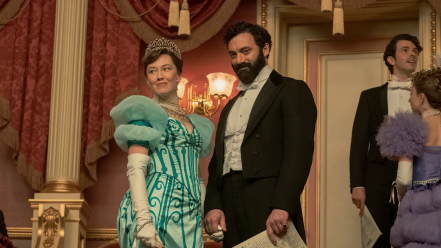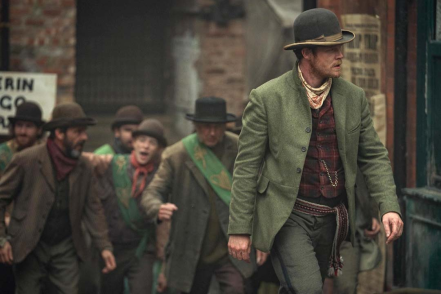
Workers at the brewery in House of Guinness
By Dennis Broe
Steven Knight’s House of Guinness, about the famous brewery which in the latter half of the 18th century moved from being a Dublin phenomenon to conquering the world, places itself squarely in the wealthy family genre, most famously epitomized by Succession but also in the U.S. consisting of series such as The Gilded Age in what has been called “wealth porn.”
It situates itself within and then explodes the genre, by incorporating the ethos of Knight’s previous series Peaky Blinders – but in the end falls prey to conservative narrative expectations.

The Gilded Age, a blind validation of the rich
The reception of this extremely high-budgeted Netflix series—episode one features the blowing up of the brewery and throughout the series boasts lavish castle sets and an excursion into the streets of Manhattan—has been mixed indeed. The global, more colonial press, The Guardian, The BBC, The Los Angeles Times, have emphasized the audacity of the series and its pure entertainment value. The Irish press view it as instead an inauthentic imprint of English colonialism. The Irish critics were especially irked that the series was primarily shot in Liverpool, which poses as Dublin. The complaint is that the Irish independence movement is horribly misrepresented with the Irish Times upset about the representation of the Fenians as “feral leprechauns.”

The Fenians in House of Guinness, radical revolutionaries or feral leprechauns?
The value of the series, though, is its corrective to the American series which besides Succession, with the Murdoch family as pathetic and paltry substitutes for the characters in King Lear, also includes The Gilded Age. with its blind focus on lionizing wealthy New Yorkers and its tone deafness to Mark Twain’s coining of the term as critique of the robber barons.
The genre even extends to the contemporary Black Rabbit, where the workers in a well-to-do Greenwich Village restaurant are expected to submit themselves to the whims of their wealthy but besieged owner, a non-union situation which only Hollywood in the Trump era could dream up. The genre also includes the lionizing of luxury goods families (House of Gucci, Coco Before Chanel, Saint Laurent), a European variant of wealth celebration.
Into this muddle comes House of Guinness, which, especially in the pilot episode functions as a. multilayered critique and expansion as well as a validation of “the wealthiest family in Ireland.” The opening, which in the genre of inherited wealth is supposed to be the calamity of wealth passing hands, here is about the rancour which old man Guinness, a conservative protestant allied with the English, instills in those poorer Irish seeking independence and a better life. They spit at and throw garbage on the coffin and then are beaten by company thugs, as the carriage rolls toward the cathedral and over the eulogy commending the owner as “a man who brought peace and prosperity to the people of Dublin.”
We don’t even meet the four heirs, the children all grown, until we’ve gotten the political lay of the land and had a look inside the factory at the workers’ dynamics, with one of the recurring images being a worker stoking the coal furnace needed to brew the beer. Much of season one, to its later detriment, increasingly focuses on intrafamily dynamics, but even here, at least initially, there is a marked class construction of the siblings as well as the recurring idea that most decisions about the company hang on the family’s position vis-à-vis the Protestant/Catholic, Rich/Poor, English/Irish divide.
Arthur, a closet homosexual in a time when to be that is a crime which merits a jail sentence, is also a priggish Tory who flaunts his class position as well as his contempt of those below him. Edward, the sturdy businessman and global capitalist of the bunch, on the other hand, can’t help himself but fall in love with Ellen, the brains of the Fenians. Arthur’s romantic scenes are for the most part handled with tenderness but there is a fascinating cross-cutting in a later episode, where Arthur is serviced by an employee who he disdains to look at while Edward and Ellen meet in a mutual and, for the moment, equal embrace.
A central aspect of the third episode is the Irish Famine, the effects of which are still being felt in the Galway countryside though the worst of the starvation occurred almost forty years before. The residents are described as having the choice between cholera or emigrating to Boston, and are being starved off their land by English factory owners, with the Guinness castle, the epitome of this power, a mile down the road. They are emaciated and spend their time digging graves.
Episode two begins with Arthur’s phony wedding, a Jane Austen marriage of convenience where his wife later takes as a lover the factory foreman, but is then forced to renounce this arrangement in the name of Guinness power. The women are all trying to mate Edward, in a kind of Henry James Wings of the Dove moment. As is said about a later gathering: “Everything you see in this room is about appearance and propriety.”

Peaky Blinders’ Thomas Shelby
The Peaky influence is everywhere, most prominently in the up-to-the-minute soundtrack featuring a host of emerging Irish bands, including the group now infamous for their pro-Palestine stance, Kneecap. The foreman Rafferty strides through the series in a great black coat that matches Tommy Shelby’s walk and costume in the earlier series. The language is both high and low, a blend of splendorous phrasing and guttural cuss words. The f-word, a staple now of most streaming series, hasn’t been employed this poetically since its use by the Ian McShane character in Deadwood.
The series though eventually bends to the genre limitations of the wealthy family saga. The Guinnesses come together in the service of the brewery, though each is forced to betray their own feelings and submerge them for the good of the now global enterprise. But so they must and these betrayals in which each ends up unhappy are seen as inevitable. There is a later scene where Edward and Arthur come together to destroy the livelihood of the Fagan underworld character, akin to the Tom Hardy character in Peaky Blinders. This is presented as great fun as is the dynamiting of the wharf for Guinness expansion.
The series makes a noble effort at subverting or at least expanding the genre, but in the end, succumbs to the stricture of sacrificing all to the genre’s imperative—at a time when inequality has never been so great—to celebrate the rich.
House of Guinness is streaming on Netflix.













